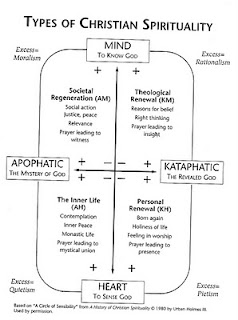William Booth on Mission's False Dichotomy...
 I stumbled across an interesting article from 1889 written by William Booth; called 'Salvation for Both Worlds', William Booth charts an interesting journey.
I stumbled across an interesting article from 1889 written by William Booth; called 'Salvation for Both Worlds', William Booth charts an interesting journey.Booth's desire was simple from the outset, 'to advance [God's] honour and carry out [God's] wishes on the earth'. The year before 'Darkest England and the Way Out' was published Booth's theology of mission takes an interesting turn.
Booth acknowledges an initial, seemingly straight forward and unsurprising theology that reflects a familiar understanding of salvation, from which there should be no distraction. 'Temporal modification' was in his mind 'trivial, almost contemptible.'
"What were the sorrows of earth when compared with everlasting damnation? Their temporary comfort or discomfort was as to nothing compared with the business of their rescue."
Booth goes on to outline how he became increasing impacted by the brokenness of society and the 'earthly miseries' he saw around him - but seeing no remedy, Booths' concept of mission remained concise and to the point "if we cannot save them for time, we will save them for eternity".
Booth's desire was simple from the outset, 'to advance [God's] honour and carry out [God's] wishes on the earth'. The year before 'Darkest England and the Way Out' was published Booth's theology of mission takes an interesting turn. The article reads almost like a testimony of how Booth recognised the shaping and morphing of his theology. It is interesting to hear Booth as he says:
"... as I came to look more closely into things and gathered more experience of the ways of God to man, I discovered that the miseries from which I ought to save man in the next world were substantially the same as those from which I everywhere found him suffering in this..."Booth's conclusion reflects an interesting breadth in his understanding of mission:
"I saw that when the bible said “He that believeth shall be saved”, it meant not only saved from the miseries of the future world, but from the miseries of this also. That it came with the promise of salvation here and now; from hell and sin and vice and idleness and extravagance and consequently very largely from poverty and disease, and the majority of kindred woes."I wonder what Booth would say to us still struggling with this one 118 years later?
I want to discover how and when this blind spot, false dichotomy, dualistic sense of mission - that William Booth had moved on from - crept back in. I might then be able to understand why such dualism is currently so well maintained and even nourished, and why the breadth of mission that Booth discovered is so vehemently derided.
So here's Booth on Mission's False Dichotomy:
"Christ is the deliverer for time as truly as for eternity..."
Booth, W. (1889) Salvation for Both Worlds, All the World, vol v (1)
Fullness of Life...shalom and salvation
Sham Compassion...Absurd Activism...Trendy Past Time
Evangelism Gone Entrepreneurial... a disappointing read!
Newbigin on Mission's False Dichotomy...
Kraybill on Mission's False Dichotomy...
Murray on Mission's False Dichotomy...
Wallis on Mission's False Dichotomy...
Guder on Mission's False Dichotomy...
Morisy on Mission's False Dichotomy...
Brueggemann on the False Dichotomy of mission...
GS Railton on Missions False Dichotomy

Comments